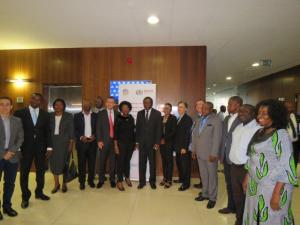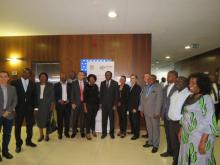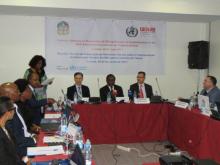Regional experts discussed how to improve reporting on Tobacco Control
Luanda, 22nd June 2017 - Experts from six African countries which are signatories of the WHO Framework Convention on Tobacco Control (WHO FCTC) and representatives from the convention secretariat gathered in Luanda, from 20-22 June, to strengthen reporting on its implementation. This meeting is a joint initiative of the FCTC, the WHO Regional Office for Africa and the Government of Angola.
This event is unique because it was organized for the first time as a mechanism to support the parties in fulfilling their reporting obligations to the treaty since its entry into force 12 years ago.
The participants are the national focal points for tobacco control from Angola, Cape-Verde, Guinea-Bissau, Equatorial-Guinea, Liberia and Zambia as well as the officers in charge of health promotion, communication and Non-communicable diseases control from WHO Country Offices in the mentioned countries.
During the last three days, the meeting was focused on reporting arrangements under the WHO FCTC, methods to access information from different sources and methodological approaches in completing the core questionnaire and voluntary questions related to the use of guidelines and identification of challenges and barriers to reporting. The countries will also complete the questionnaire using country data.
Speaking at the opening session, Dr Tibor Szilagyi, FCTC Team Leader at the WHO FCTC in Geneva, called upon the World Health Organization to include the technical assistance in reporting on the implementation of the FCTC in its respective country cooperation strategies. «Reporting is a key requirement of any international treaty because it allows Parties to inform each other about their progress, but also about difficulties and challenges in implementing the treaty,» he said, adding that «provides a basis for a more in-depth analysis of needs and gaps, including, but not limited to needs assessment exercises mandated by the Conference of the Parties (COP)».
The WHO Representative in Angola, Dr. Hernando Agudelo, said that the meeting in Luanda responds to the needs to provide the countries of the region with reliable tools for data collection and reporting on the negative impact of tobacco in their economic, social live and health expenditures. «We hope that the various barriers and obstacles to accomplish this exercise will be well identified and the countries here represented will be able to receive the necessary technical support for more successful work in the future», he said.
The Angolan Health Minister, Dr. Luis Gomes Sambo, welcomed the participants and the meeting's objectives regarding the collection of evidences and research on the impact of tobacco, stressing that «the lack of skilled human resources remains one of the greatest challenges that our countries are facing».
The Member States of the WHO Framework Convention on Tobacco Control have also been encouraged to use the taxes proceeding from the sale of tobacco products to fund universal health coverage, health promotion and other development programs.
In force since February 2005, the WHO FCTC is the first international treaty on a public health matter; the convention hasbeen ratified up to date by180 countries including 46 countries of the African region, that are committed towards its implementation.
______________________________________________
For more information, please contact:
Edith Pereira, WHO Communication Officer, Cape-Vert, email: epereira [at] who.int
José Caetano, WHO Communication Officer, Angola, email: soarescaetanoj [at] who.int
Norah Mweemba, WHO Communication Officer, Zambia, email: mweemban [at] who.int
Below:
01. View of the participants to the tobacco meeting gathered in Luanda
02. Opening ceremony of the Tobacco Meeting in Luanda


